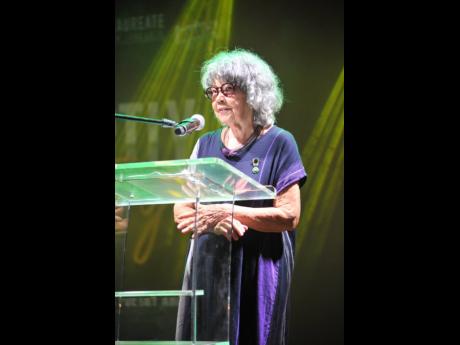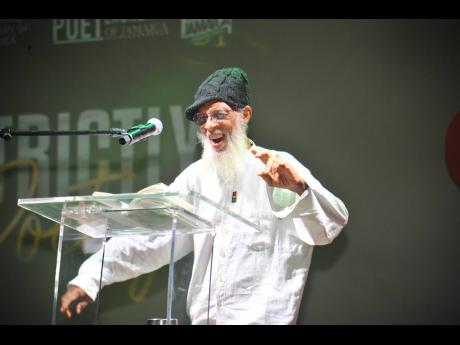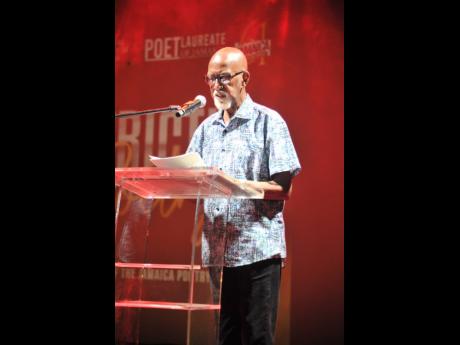Digital archive to shake up access to, understanding of Jamaican poetry
The launch of the digital Jamaica Poetry Archive is set to shake up the access to and understanding of literature and Jamaican culture by increasing accessibility to Jamaican poetry.
A digital treasure trove of seminal works, it will serve as a vital educational resource for students studying literature, Jamaican culture, and related fields. It will provide access to audio recordings of poets reciting their works, allowing students to engage with the nuances of pronunciation, rhythm, and emotion that make poetry a living, breathing art form.
No place was this displayed than at the launch held last Thursday night.
Dr Kathy Brown’s audience was enjoying her happy music when, at 7:31 p.m., their world started shaking. It might have been her medical training that kept her seated, calm and reassuring, at her keyboard on stage.
In the audience, however, Joy Douglas snapped into action. Metaphorically speaking, she replaced her hat as chair of the National Library, which had been dislodged by the earthquake, and donned her helmet as chair of the Office of Disaster Preparedness and Emergency Management (ODPEM). Then she grabbed her phone and started doing disaster management business.
Later, from the stage, she was to tell Dr Brown and the audience, who like her had remained seated, “You should have crouched … . The rule is drop, cover and hold.”
This happened at 10A West Kings House Road at an event celebrating the Jamaica Poetry Archive, “an electronic collection of outstanding Jamaican poets reading their work”.
Publicity material handed out that evening indicated, ostensibly in the words of Poet Laureate Olive Senior, that we could also “see the text of the selected poems, and learn more about our distinguished poets located in Jamaica and overseas.”
The electronic archive, it continues, “is housed at the National Library of Jamaica under the Poet Laureate of Jamaica programme and currently hosts 20 living poets. (A subsection for deceased poets will be created later.) New poets will be added each year as the project grows. It will expand to recognise outstanding poets of the past, as well as poets to watch”.
The highlight of the evening was the readings of poems by the authors, some in person, others via video. They had been asked to read by Senior, who read her own poem, Embroidery, last – the cherry on the top of a multi-layered, multi-flavoured cake. It is about the persona, a bit of a loner, becoming close to an ostracised aunt.
That Senior wanted variety was clear from the poets chosen to read. First on stage was Mervyn Morris, who quipped that in the three minutes he was given, he could read 10 poems. It might have been 10; it was a lot, and one lost count, especially as there were as many themes as poems. Quite fitting from the former poet laureate.
Next, on video, the Canada-based Pam Mordecai read from her New Testament trilogy on the life of Jesus. The conversations of the characters made the incidents come vibrantly alive.
Ann-Margaret Lim’s contrasting poems The Dance 1986 and The Dance 2006 showed how violent dancehall scenes and, by extension, the country, became in the 20 years. Geoffrey Philp, on video, spoke of his concern for his beloved hurricane-battered, climate change-ravaged Caribbean.
Delores Gauntlett spoke of domestic issues, both humorous and poignant, with her poems on getting rid of a croaking lizard, meeting a resilient friend coming home to die, and spending a pleasant Sunday morning at home.
Edward Baugh, he of the sonorous voice, read via video of a boyhood incident involving a not-so-close, but still scary, encounter with a warner woman and another poem warning a rival for his woman’s affections to leave her alone. Opal Palmer Adisa, Velma Pollard (video) and Oku Onuora all went back in time for their poetic themes, but while the women’s works evoked feelings of nostalgia, dub poet Onuora recalled his rage during his days of incarceration.
Earl McKenzie (on video) also went back in time, to the environment of the Tainos, enslaved artists and a long-ago ride through sugar cane fields and his delight in the sweet smells. Malachi Smith (on video) was, as usual, dramatic as he read about a kumina king.
Bringing greetings from the Ministry of Culture, Gender, Entertainment and Sport, Permanent Secretary Dean-Roy Bernard assured the audience that the work of the NLJ demonstrated that libraries are not becoming obsolete, as shown, for example, by the poet laureate programme, where “great things are happening”.
He said, “The creativity we will partake of tonight, when put into different contexts, can impact hearts and minds, challenge the status quo, and reimagine better worlds for our generation, and the next. And this is exactly the crux of positive culture-led development.”
The archive is open to poets of all types – whether they write, speak or perform their work Those with a substantial body of printed or recorded work and who have won critical acclaim will be considered for inclusion. The public can submit names of poets for a longlist.
The selected poets should submit audio recordings and text of their chosen poems, as well as an up-to-date biography and professional photograph. The archive may be accessed at japoetryarchive.nlj.gov.jm.



